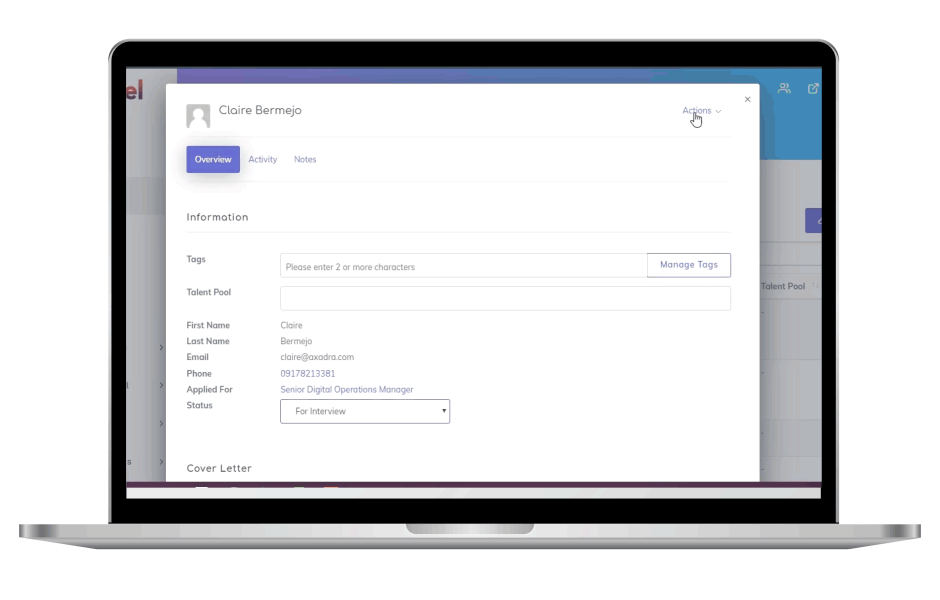The interview process is where you as a recruiter have the most control over who fills your roster of employees. With a good list of interview questions, you can effectively decide if the candidate’s skills, work ethics, and personality align with your company’s needs and culture. You can gather valuable knowledge about your potential colleague that you would otherwise not get out of a resume.
Many HR teams and recruiters today use behavioral based interviewing as a technique to find out more about a candidate’s skills, values, and attitudes. They use common behavioral interview questions to help uncover a candidate’s approach to problems, stress, and conflicts.
In this article, we tackle the definition of behavioral-based interviewing, highlight common behavioral interview questions, and guide you on conducting one of your own.
What is behavioral-based interviewing?
Behavioral interviewing is based on the idea that how a candidate performed or behaved in their past job is the best predictor for how they will behave in your company and the role they’re applying for. To gather such information, interviewers first identify the competencies or skills necessary for a particular position. For example: persuasive, decision-making, and problem-solving skills. Interviewers then use a series of probing behavioral-based interview questions to reveal whether the candidates actually possess the qualities or skills they mentioned.
Instead of simply asking candidates what they did in their previous jobs, behavioral-based interview questions ask candidates how and why they did specific actions. This approach is extremely effective at identifying unqualified candidates or those who exaggerate their credentials in resumes and interviews. Once you know how to use common behavioral interview questions to your advantage, you’ll hire the most competent candidates who fit your company culture.
What are some behavioral interview questions?
Here are examples of common behavioral interview questions:
- What’s a goal you reached and how were you able to achieve it?
Provides context on their work ethics, the capacity of their skills, and their determination to see things through.
- What’s a goal you didn’t meet? How were you able to handle the disappointment?
Offers a glimpse of how they’ll handle setbacks and if they can recover quickly from mistakes and ensure said issues don’t present themselves again in the future.
- Think about a time when you were tasked to work on multiple projects. How did you prioritize to complete the most pressing tasks?
A good way to assess their time management and multitasking skills. Also lets you know if they understand how to prioritize urgent tasks from ones that can take the backseat.
- How do you handle tight deadlines?
Lets you see if they can work under pressure and manage their stress in a fast-paced work environment.
- Have you ever handled a difficult situation with a colleague? If so, how?
This question is effective at measuring their interpersonal skills and how they handle people with different temperaments.
- Have you ever motivated other team members while working on a project? If so, how?
Of course, you want to onboard people who are not only cooperative but encouraging as well. This will help you build a team that constantly lifts each other up and inspires each other to be the best at what they do.
- Tell me about a time when you improved a process at your past job.
A good way to see if they’re proactive and can easily spot gaps in operations. As an employer, you want employees who truly care about the growth of your company.
- Tell me about a time when you went above and beyond in your role.
Lets you select candidates who do more than just the bare minimum or what’s expected of them. Candidates who overperform in their previous jobs are always better than mediocre ones who only choose to finish their tasks and call it a day.
- Tell me about the most difficult thing you had to do at your previous job.
As human beings, it’s only natural that there are certain tasks we find difficult, even if they’re seemingly simple to others. This is a good way to gauge their areas for improvement and if your company has the necessary resources to train the candidate.
- What is your greatest accomplishment and why?
This is a good way to know what sets the candidate apart from other applicants, to gain a better sense of what they’ve done in the past, and what the candidate values in their previous role.
What’s the purpose of behavioral-based interview questions?
Regardless of the nature of employment, good employee performance constitutes an amalgam of qualities – everything from having the necessary expertise and experience to being able to assimilate into the workplace culture. Here’s how behavioral-based interview questions provide superior recruitment insight:
They provide real-life examples
It’s very easy for candidates to list down skills and strengths on their resume but it’s much more difficult to lie when they’re presented with common behavioral interview questions. As behavioral-based interview questions require candidates to share real-life examples, it’s tough to make those up on the spot. Candidates are pushed to give details of actual experiences rather than relying on their skills to appeal to recruiters.
They’re easily customizable for your company
Traditional interview questions are typically easy to answer. Anybody who prepares for the interview can quickly answer questions such as “Tell me about yourself” and “What are your strengths and weaknesses?” On the other hand, you can customize common behavioral interview questions to specific job positions. Since they can be specific, it’s more difficult for candidates to prepare for them, allowing recruiters to look past the surface of a polished, well-rehearsed interviewee.
They help you make better-informed hiring decisions
An often overlooked but critical part of performing well in the company is the ability to work well within the structure of the workplace culture. Sometimes candidates have expert skills and great experience but their personality is not the best match for a specific job. Common behavioral questions allow recruiters to gain a much deeper insight into the personality and values of an individual. For instance, if a certain candidate performs incredibly well unsupervised but isn’t team-oriented, then they’re not fit for a role that requires constant collaboration. The only way to extract this type of information is by using behavioral-based interview questions in the recruitment process.
How to assess candidates with common behavioral interview questions?
If not used properly, common behavioral interview questions can become victims of their own success. Common behavioral interview questions can be predictable and overly-structured, and there’s even an industry that currently exists to coach potential candidates on how to prepare for them. Here are suggestions on how to conduct a great interview with behavioral based questions:
- Use a process of discovery. Rather than relying on predictable, common behavioral interview questions, use ones that are specifically geared to each candidate when you receive answers that need follow-up questions. Clarify their answers until you’re satisfied that they’re genuine with their replies.
- Take time to get the complete picture of a candidate. It’s essential to know the combination of a candidate’s strengths and weaknesses. The key strengths and competencies you’re looking for don’t stand alone, so they need to be considered in relation to all of the candidate’s qualities. For instance, someone who has solid analytical skills can lose some of that edge or advantage if they are indecisive as a person. Their indecisiveness can seep into their professional conduct. As much as possible, seek repeated evidence that shows a behavior pattern.
- Ask what the candidate learned from past experiences. This helps confirm the authenticity of their claimed accomplishments and setbacks. It also reveals their capacity to grow in a position.
Don’t forget The STAR Method
Aside from the tips listed above to leverage the power of common behavioral interview questions, the STAR method is a structured manner that you can use to assess the answers of candidates.
The STAR method assesses the following:
- Situation: The candidate describes the situation they were in or the task they had to accomplish. They must be able to describe a specific situation or event, not a generalized description of what they did in the past. The more detailed, the better.
- Task: What is the goal that they were working toward? They should be able to describe this in detail, including the objectives of the task.
- Action: The candidate should explain the actions that they took to address the situation. This includes the steps they took and their specific contributions. See to it that they talk about what they actually did, not what the team or group accomplished.
- Result: The candidate should describe the outcome of their actions and not be shy about taking credit for their exemplary behavior. They should be able to explain what happened, what they accomplished, and what they learned.
Using the STAR method as a basis provides you with a simple checklist or framework in mind. It also allows you to assess a candidate’s answers accurately and dig deeper into an interviewee’s potential.
Elevate Your Recruitment with Behavioral Based Interview Questions
At the end of the day, you don’t just want to know a candidate’s skills and experience. You want to understand how they’ve impacted businesses in the past and how they’re going to impact your company when they get hired.
Common behavioral interview questions enable you to do so. However, remember that they should be used wisely and sparingly. Asking ten behavioral-based interview questions in a row will only confuse you and your candidate. It’s good to have a healthy mix of standard interview questions and behavioral interview questions. Allow candidates to warm up first with the standard questions before diving into the behavioral ones.
So after you’ve booked a candidate’s interview in your recruiting interview scheduling tool, prepare a list of behavioral-based questions. You can use the common behavioral interview questions listed above and best practices on conducting them to ensure you provide as many opportunities as possible for candidates to demonstrate how they can help your company succeed. When done properly, behavioral-based interviewing questions and tactics will help you create insightful, candid, and valuable conversations with job applicants.

















